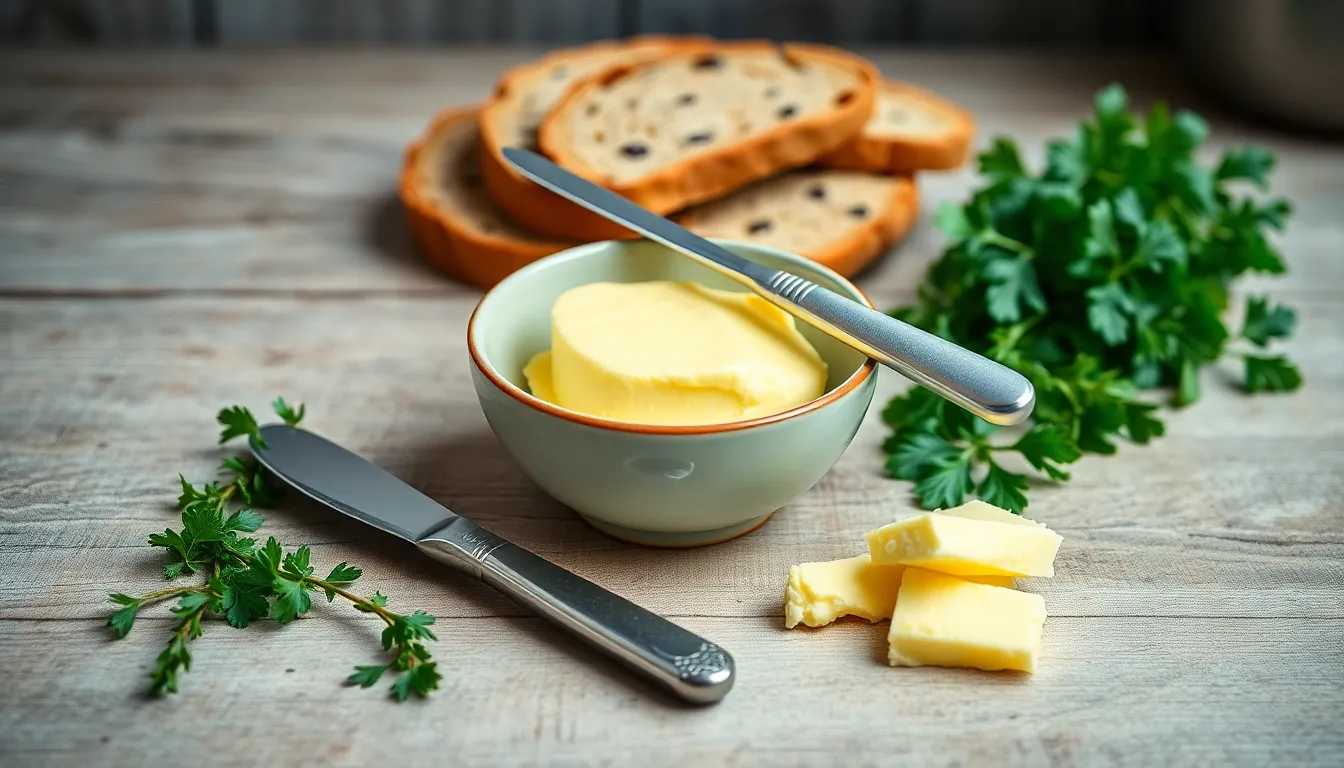Phone:
(701)814-6992
Physical address:
6296 Donnelly Plaza
Ratkeville, Bahamas.

Unsalted butter might not get the spotlight it deserves, but it’s time to spread the word about this creamy delight. While some might think of it as just a cooking staple, unsalted butter packs a nutritional punch that deserves attention. It’s like the quiet kid in class who turns out to be a math genius—unassuming but oh-so-important.
With its rich flavor and versatility, unsalted butter is a favorite among chefs and home cooks alike. But beyond its culinary charm, it’s loaded with essential nutrients that can elevate any diet. From healthy fats to vitamins, unsalted butter is more than just a tasty addition to your recipes. Dive into the world of unsalted butter nutrition and discover how this simple ingredient can enhance your meals and your health. Who knew butter could be this exciting?
Unsalted butter contributes essential nutrients and healthy fats, enhancing overall nutritional balance. Its macronutrient and micronutrient profiles provide critical insights into its health benefits.
Unsalted butter primarily consists of fats, with roughly 81% total fat content. Saturated fat accounts for about 51%, while mono- and polyunsaturated fats make up the remaining portion. Each tablespoon (14 grams) offers approximately 102 calories, making it energy-dense. Protein content remains minimal at about 0.1 grams per tablespoon. Carbohydrates are negligible, typically less than 1 gram, which aligns with low-carb dietary preferences.
Unsalted butter houses several important vitamins and minerals. It contains about 7% of the daily value for Vitamin A in a single tablespoon, crucial for vision and immune function. Additionally, Vitamin D is present, supporting bone health and calcium absorption. Butter features Vitamin E, an antioxidant that helps protect cells from damage. Trace elements like calcium and phosphorus aid in muscle function and energy metabolism. Concentration of these micronutrients enhances the overall nutritional value of unsalted butter as part of a balanced diet.

Unsalted butter offers significant health benefits due to its rich nutritional profile. Its essential vitamins and healthy fats contribute to overall wellness.
Unsalted butter provides vital vitamins that promote health. Vitamin A plays a crucial role in maintaining vision and immune function. This dairy product also contains Vitamin D, which supports calcium absorption and bone health. Additionally, Vitamin E acts as an antioxidant, protecting cells from damage. Each tablespoon contains about 7% of the daily recommended intake of these vitamins. Regular consumption of unsalted butter enhances dietary vitamin levels, contributing to various bodily functions.
Unsalted butter serves as a source of healthy fats essential for a balanced diet. Approximately 51% of its total fat content consists of saturated fats, which can support hormone production and overall energy levels. Healthy fats from unsalted butter provide a concentrated energy source for the body. Incorporating this ingredient can aid in nutrient absorption, enhancing the body’s capacity to utilize fat-soluble vitamins. The presence of butyrate, a beneficial short-chain fatty acid, promotes gut health. Opting for unsalted butter encourages a well-rounded intake of dietary fats, contributing to improved overall health.
Understanding the distinctions between unsalted and salted butter provides insight into their nutritional profiles and culinary applications.
Unsalted butter has a unique nutritional composition. It typically contains about 81% fat, while saturated fat accounts for around 51%. Each tablespoon of unsalted butter provides roughly 102 calories, with minimal protein and carbohydrates. Salted butter contains similar calorie counts but includes added sodium, which alters its sodium content significantly, averaging around 90 mg per tablespoon. Unsalted butter features higher levels of vitamins A, D, and E, delivering approximately 7% of the daily recommended intake per tablespoon. These vitamins contribute essential health benefits and are absent in the greater amounts found in salted butter.
Cooks often prefer unsalted butter for its versatility. It allows for precise control over the seasoning in recipes. Baking often demands unsalted butter to achieve the intended flavor balance, as the salt content can skew the recipe’s outcomes. Chefs use unsalted butter when crafting sauces, as its pure butter flavor enhances the final dish. Unsalted butter works best in delicate flavors, letting herbs and spices shine. Salted butter finds its place in spreads and finishing touches but may not substitute well in case of baking or controlled flavor profiles. By making conscious choices between the two types, culinary results can improve markedly.
Unsalted butter serves as a versatile ingredient that enhances flavor and nutritional value in meals. It can be incorporated into various dishes to improve health benefits while enjoying rich taste.
In baking, using unsalted butter allows accurate control over the salt content in recipes. Recipes for cookies, cakes, or pastries benefit from the creamy texture that unsalted butter provides. When sautéing or roasting vegetables, unsalted butter adds richness and enhances natural flavors. It’s ideal for sauces and dressings since it avoids unwanted saltiness. Additionally, unsalted butter works well in mashed potatoes, adding a luxurious creaminess. Experimenting with herbs and spices when using unsalted butter can elevate simple dishes to gourmet levels.
One tablespoon of unsalted butter contains about 102 calories and offers essential vitamins and healthy fats. For most adults, including one to two tablespoons per day fits within a balanced diet. It can complement whole grain bread or vegetables for an energy-boosting snack or side dish. Consuming the recommended serving of 5 to 7 grams of saturated fat aligns with dietary guidelines. Balancing unsalted butter within meal planning ensures enjoying its benefits without exceeding daily fat recommendations. Regularly incorporating it into meals supports health while providing rich taste.
Unsalted butter stands out as a nutritional powerhouse that can elevate both flavor and health. Its rich content of essential vitamins and healthy fats makes it a valuable addition to a balanced diet. By choosing unsalted butter over salted varieties, individuals can enjoy the benefits without the added sodium, allowing for greater culinary creativity.
Incorporating unsalted butter into daily meals not only enhances taste but also supports nutrient absorption and overall wellness. With its versatility in cooking and baking, unsalted butter can be a delightful and nutritious choice. Embracing this ingredient can lead to a more flavorful and health-conscious approach to cooking.